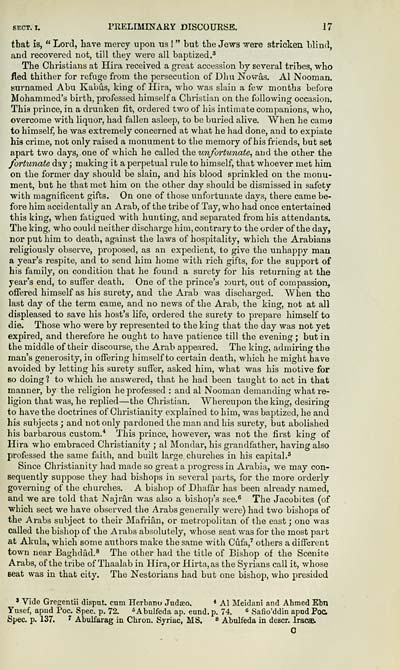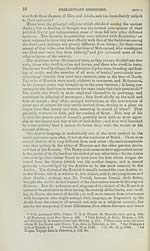Download files
Complete book:
Individual page:
Thumbnail gallery: Grid view | List view

SECT. I, PRELIMTNAiJY DISCO UKSE, 17
that is, " Lord, have mercy upon us ! " but the Jews were stricken Llind,
and recovered not, till they were all baptized.^
The Christians at Hira received a great accession by several tribes, who
fled thither for refuge from the persecution of Dhu Nowas. Al Nooman,
surnamed Abu Kahus, king of Hira, who was slain a few months before
Mohammed's birth, professed himself a Christian on the following occasion,
This prince, in a drunken fit, ordered two of his intimate companions, who,
overcome with liquor, had fallen asleep, to be buried alive. When he caniy
to himself, he was extremely concerned at what he had done, and to expiate
his crime, not only raised a monument to the memory of his friends, but set
apart two days,. one of which he called the unfortunate^ and the other the
fortunate day ; making it a perpetual rule to himself, that whoever met him
on the former day should be slain, and his blood sprinkled on the monu-
ment, but he that met him on the other day should be dismissed in safety
with magnificent gifts. On one of those unfortunate days, there came be-
fore him accidentally an Arab, of the tribe of Tay, who had once entertained
this king, when fatigued with hunting, and separated from his attendants.
The king, who could neither discharge him, contrary to the order of the day,
nor put him to death, against the laws of hospitality, which the Arabians
religiously observe, proposed, as an expedient, to give the unhappy man
a year's respite, and to send him home with rich gifts, for the support of
his family, on condition that he found a surety for his returning at the
year's end, to sufier death. One of the prince's ;ourt, out of compassion,
ofiered himself as his surety, and the Arab was discharged. When the
last day of the term came, and no news of the Arab, the king, not at all
displeased to save his host's life, ordered the surety to prepare himself to
die. Those who were by represented to the king that the day was not yet
expired, and therefore he ought to have patience till the evening; but in
the middle of their discourse, the Arab appeai-ed. The king, admiring the
man's generosity, in ofiering himself to certain death, which he might have
avoided by letting his surety suSer, asked him, what was his motive for
so doing % to which he answered, that he had been taught to act in that
manner, by the religion he professed : and al Nooman demanding what re-
ligion that was, he replied — the Christian. Whereupon the king, desiring
to have the doctrines of Christianity explained to him, was baptized, he and
his subjects ; and not only pardoned the man and his surety, but abolished
his barbarous custom.'* This prince, however, was not the first king of
Hira who embraced Christianity ; al Mondar, his grandfather, having also
professed the same faith, and built large churches in his capital.^
Since Christianity had made so great a progress in Arabia, we may con-
sequently suppose they had bishops in several parts, for the more orderly
governing of the churches. A bishop of Dhafar has been already named,
and we are told that Najran was also a bishop's see.^ The Jacobites (of
which sect we have observed the Arabs generally were) had two bishops of
the Arabs subject to their Mafrian, or metrojjolitan of the east ; one was
called the bishop of the Arabs absolutely, whose seat was for the most pai't
at Akula, which some authoi'S make the same with Cilfa,^ others a difierent
town near Baghdad.^ The other had the title of Bishop of the Sceuite
Arabs, of the tribe of Thaalab in Hira,or Hirta,as the Syrians call it, whose
Beat was in that city. The Nestorians had but one bishop, who presided
» Vide Gregentii disput. cum Herbano JudiEO. * Al Meidani and Ahmed Ebn
Yusef, apud Poc. Spec. p. 72. * Abulfeda ap. eund. p. 74. « Safio'ddin apnd Pot
Spec. p. 137. ^ Abulfarag in Chron. Syriac, MS. ^ Abulfeda in descr. IracflB.
that is, " Lord, have mercy upon us ! " but the Jews were stricken Llind,
and recovered not, till they were all baptized.^
The Christians at Hira received a great accession by several tribes, who
fled thither for refuge from the persecution of Dhu Nowas. Al Nooman,
surnamed Abu Kahus, king of Hira, who was slain a few months before
Mohammed's birth, professed himself a Christian on the following occasion,
This prince, in a drunken fit, ordered two of his intimate companions, who,
overcome with liquor, had fallen asleep, to be buried alive. When he caniy
to himself, he was extremely concerned at what he had done, and to expiate
his crime, not only raised a monument to the memory of his friends, but set
apart two days,. one of which he called the unfortunate^ and the other the
fortunate day ; making it a perpetual rule to himself, that whoever met him
on the former day should be slain, and his blood sprinkled on the monu-
ment, but he that met him on the other day should be dismissed in safety
with magnificent gifts. On one of those unfortunate days, there came be-
fore him accidentally an Arab, of the tribe of Tay, who had once entertained
this king, when fatigued with hunting, and separated from his attendants.
The king, who could neither discharge him, contrary to the order of the day,
nor put him to death, against the laws of hospitality, which the Arabians
religiously observe, proposed, as an expedient, to give the unhappy man
a year's respite, and to send him home with rich gifts, for the support of
his family, on condition that he found a surety for his returning at the
year's end, to sufier death. One of the prince's ;ourt, out of compassion,
ofiered himself as his surety, and the Arab was discharged. When the
last day of the term came, and no news of the Arab, the king, not at all
displeased to save his host's life, ordered the surety to prepare himself to
die. Those who were by represented to the king that the day was not yet
expired, and therefore he ought to have patience till the evening; but in
the middle of their discourse, the Arab appeai-ed. The king, admiring the
man's generosity, in ofiering himself to certain death, which he might have
avoided by letting his surety suSer, asked him, what was his motive for
so doing % to which he answered, that he had been taught to act in that
manner, by the religion he professed : and al Nooman demanding what re-
ligion that was, he replied — the Christian. Whereupon the king, desiring
to have the doctrines of Christianity explained to him, was baptized, he and
his subjects ; and not only pardoned the man and his surety, but abolished
his barbarous custom.'* This prince, however, was not the first king of
Hira who embraced Christianity ; al Mondar, his grandfather, having also
professed the same faith, and built large churches in his capital.^
Since Christianity had made so great a progress in Arabia, we may con-
sequently suppose they had bishops in several parts, for the more orderly
governing of the churches. A bishop of Dhafar has been already named,
and we are told that Najran was also a bishop's see.^ The Jacobites (of
which sect we have observed the Arabs generally were) had two bishops of
the Arabs subject to their Mafrian, or metrojjolitan of the east ; one was
called the bishop of the Arabs absolutely, whose seat was for the most pai't
at Akula, which some authoi'S make the same with Cilfa,^ others a difierent
town near Baghdad.^ The other had the title of Bishop of the Sceuite
Arabs, of the tribe of Thaalab in Hira,or Hirta,as the Syrians call it, whose
Beat was in that city. The Nestorians had but one bishop, who presided
» Vide Gregentii disput. cum Herbano JudiEO. * Al Meidani and Ahmed Ebn
Yusef, apud Poc. Spec. p. 72. * Abulfeda ap. eund. p. 74. « Safio'ddin apnd Pot
Spec. p. 137. ^ Abulfarag in Chron. Syriac, MS. ^ Abulfeda in descr. IracflB.
Set display mode to: Large image | Transcription
Images and transcriptions on this page, including medium image downloads, may be used under the Creative Commons Attribution 4.0 International Licence unless otherwise stated. ![]()
| Early Gaelic Book Collections > J. F. Campbell Collection > Koran: or, Alcoran of Mohammed > (39) |
|---|
| Permanent URL | https://digital.nls.uk/77134524 |
|---|
| Description | Volumes from a collection of 610 books rich in Highland folklore, Ossianic literature and other Celtic subjects. Many of the books annotated by John Francis Campbell of Islay, who assembled the collection. |
|---|
| Description | Selected items from five 'Special and Named Printed Collections'. Includes books in Gaelic and other Celtic languages, works about the Gaels, their languages, literature, culture and history. |
|---|

